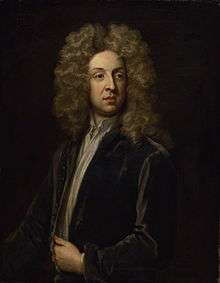Arthur Maynwaring

Arthur Maynwaring or Mainwaring (1668–1712) was an English official, Whig politician, and author.
Life
He was born at Ightfield, Shropshire; Sir Arthur Mainwaring was his grandfather. His father was Charles Maynwaring, eldest son of Sir Arthur, and his mother was the daughter of Charles Cholmley of Vale Royal, Cheshire. He attended Shrewsbury grammar school, was sent at 15 to Christ Church, Oxford (1683), leaving without a degree, and in 1687 entered the Inner Temple.[1]
Maynwaring supported the losing Jacobite side at the Glorious Revolution, and his non-juring uncle, Sir Francis Cholmley, encouraged his Stuart sympathies. From Cheshire he came to live with his father in Essex Street, Strand, London, to study law. Lord Cholmondeley and the Earl of Burlington introduced him to Lord Somers and other prominent Whigs, and Maynwaring altered his politics.[1][2]
In politics
On his father's death around 1693, Maynwaring inherited an estate, gave up the law, and raising money on Ightfield, devoted himself to political and social life. When the treaty of Ryswick in 1697 reopened communication with France he went to Paris, where he met Boileau and La Fontaine. Now a Whig, he was made a member of the Kit-Cat Club, and received through Montague a commissionership of customs. In 1705 Sidney Godolphin rewarded his political services by appointing him auditor of imprests. His relationship with the actress Anne Oldfield began somewhat earlier.[1] He was a close friend of Sarah Churchill, Duchess of Marlborough, and considered himself her secretary.[3]
On 27 December 1706 Maynwaring was elected Member of Parliament for the borough of Preston, and continued to represent it until 1710. He was M.P. for West Looe from 1710 till his death. In 1709–1710 Maynwaring was a fiery advocate of the prosecution of Henry Sacheverell.[1]
Maynwaring's health gave way, as he went down with consumption. He worked on at journalism, incessantly, towards the end of the War of the Spanish Succession, and kept up his duties as auditor in person. He died on 14 November 1712. Anne Oldfield as executrix divided his property equally between her and his sister, using her share upon the education of their son, Arthur Maynwaring. Three months after his death, 9 February 1713, the Tory Examiner attacked his character, and Robert Walpole replied.[1]
Works
A first literary effort, Tarquin and Tullia, an outspoken satire on William and Mary, was published by Maynwaring quite soon after moving to London. The next year, in the King of Hearts, he ridiculed Henry Booth, 1st Earl of Warrington and his Cheshire men entering London in state. The verses, published anonymously, sold well, were attributed to John Dryden, and made the author's fortune. He wrote a number of prologues for Anne Oldfield.[1]
Maynwaring attacked Sacheverell and his supporters in a merciless fashion in the Letters to a Friend in North Britain. Hannibal and Hanno, a defence of the Duke of Marlborough, belongs to the same period.[1]
The exact part taken by Maynwaring in the Whig Examiner, the first number of which appeared on 14 September 1710, five weeks after its rival the Tory Examiner, is not clear. Dissatisfied with the shared name Examiner, while running the paper, he planned The Medley, and on 5 October the first number was issued. During the ten months that it lasted the Medley was almost entirely Maynwaring's own work, hounding the Examiner with criticisms. Robert Harley to try to gag it, but the attorney-general refused to move.[1]
With 1711 the Tory position seemed secure; on 26 July the Examiner was dropped, and in the following week the last Medley was printed. Grub Street, Jonathan Swift pronounced, was dead. He published an attack on French policy towards the close of the year; in 1712 he was engaged on a history of the march to the battle of Blenheim, based on a diary kept by Francis Hare. A fragment was printed, by John Oldmixon.[1]
Notes
- 1 2 3 4 5 6 7 8 9
 Lee, Sidney, ed. (1893). "Mainwaring, Arthur". Dictionary of National Biography. 35. London: Smith, Elder & Co.
Lee, Sidney, ed. (1893). "Mainwaring, Arthur". Dictionary of National Biography. 35. London: Smith, Elder & Co. - ↑ Tim Thornton (1 January 2006). Prophecy, Politics and the People in Early Modern England. Boydell & Brewer Ltd. p. 124. ISBN 978-1-84383-259-1.
- ↑ Rachel Judith Weil (1999). Political Passions: Gender, the Family, and Political Argument in England, 1680–1714. Manchester University Press. p. 208. ISBN 978-0-7190-5622-2.
- Attribution
![]() This article incorporates text from a publication now in the public domain: Lee, Sidney, ed. (1893). "Mainwaring, Arthur". Dictionary of National Biography. 35. London: Smith, Elder & Co.
This article incorporates text from a publication now in the public domain: Lee, Sidney, ed. (1893). "Mainwaring, Arthur". Dictionary of National Biography. 35. London: Smith, Elder & Co.
External links
- Works by Arthur Maynwaring at Project Gutenberg
- Works by or about Arthur Maynwaring at Internet Archive
| Parliament of England | ||
|---|---|---|
| Preceded by Francis Annesley Edward Rigby |
Member of Parliament for Preston 1706 – 1707 With: Francis Annesley |
Succeeded by Parliament of Great Britain |
| Parliament of Great Britain | ||
| Preceded by Parliament of England |
Member of Parliament for Preston 1707 – 1710 With: Francis Annesley to 1708 Henry Fleetwood from 1708 |
Succeeded by Henry Fleetwood Sir Henry Hoghton, Bt |
| Preceded by Sir Charles Hedges John Conyers |
Member of Parliament for West Looe 1710 – 1713 With: Sir Charles Hedges |
Succeeded by Sir Charles Hedges John Trelawny |